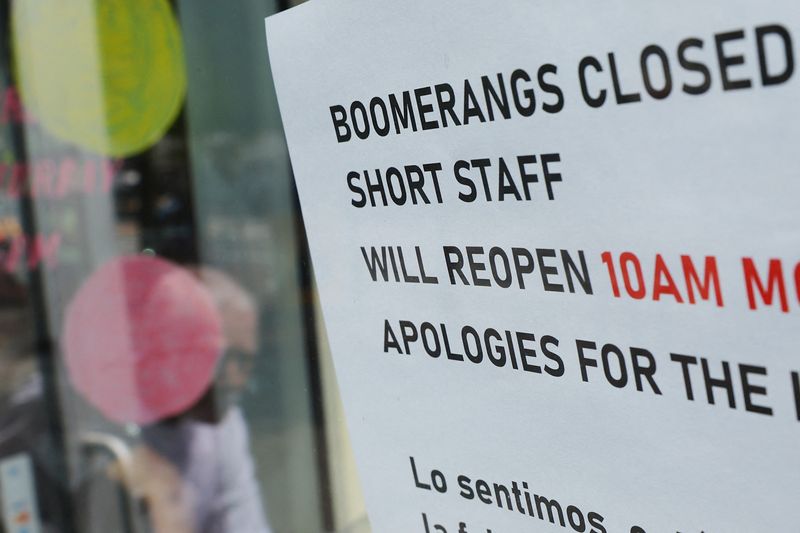Select Language

By Dan Burns
(Reuters) -Hiring plans among U.S. small businesses in March were the weakest since May 2020 when pandemic shutdowns threw the economy into recession, dropping below a key threshold some economists see as a bellwether for the wider job market, a survey out on Thursday showed.
A net 11% of firms surveyed by the National Federation of Independent Business last month said they plan to create new jobs in the next three months, down from 12% in February. With the decline, the index is now below its historic average of 11.8%.
"Job creation plans are now below what would be typical in a strong growth economy," NFIB said in its report.
The NFIB report comes a day before the monthly payrolls report from the Bureau of Labor Statistics, which is expected to show 200,000 new jobs were created in March, down from the 275,000 initially reported for February and the lowest total since November.
Job growth has slowed over the last two years, averaging nearly 230,000 a month over the 12 months through February, which is down from about 350,000 a month in the year through February 2023.
The slowdown comes in the face of stiff interest rate hikes by the U.S. Federal Reserve aimed at containing inflation, but job growth nonetheless has defied expectations for it to weaken much more than it has. The monthly growth rate is still well above the 190,000 a month average over the five years prior to the pandemic.
Still, with the Fed so far reluctant to begin reversing course and start lowering interest rates, economists are on heightened watch for any indication of developing weakness in hiring, and the NFIB report is one that bears watching, they say, as it shows a reliable correlation with the BLS data with a lag of several months.
While the outlook for hiring has dimmed, current hiring has held up, with 56% of firms saying they were hiring or trying to hire workers last month, unchanged from February.
"For now, employment activity remains solid, although waning from peak levels," the report said.
The NFIB report, like a separate report from payrolls processor ADP published on Wednesday, showed firms facing greater wage pressures last month. A net 38% in last month's NFIB survey reported raising compensation, up 3 points from February, which had been the lowest reading since May 2021. A net 21% plan to raise compensation in the next three months, up 2 points from February.

By Kevin Buckland
TOKYO (Reuters) - Japan's Nikkei share average tumbled more than 2% to a three-week low on Friday, putting it on course for its worst week since December 2022 as tech shares slid on Wall Street's lead.
Investors were also cautious ahead of a key monthly U.S. jobs report due later in the day, with the outlook for when the Federal Reserve will cut interest rates becoming increasingly unclear this week.
The Nikkei was down 2.42%, or 961 points, at 38,812.24, as of the midday recess, bringing its loss for the week to 3.86%.
"The biggest factor for the Nikkei's decline is technical," said Kazuo Kamitani, an equities strategist at Nomura Securities.
The benchmark index was poised for a second weekly loss, after it rallied to an all-time high of 41,087.75 on March 22.
The 25-day moving average turned lower on Friday, and should it remain that way, "there's the risk that the Nikkei is in for another step down from here," he said.
"The 25-day moving average has a mysterious gravitational pull, and is very much in focus for the market," Kamitani added. "All of next week, stock market moves could be a bit volatile."
Chip sector shares were among the biggest drags on Friday, with Tokyo Electron dropping nearly 5% to shave 192 points from the Nikkei. Advantest erased another 78 points with a 4.7% decline.
Other notable losers included startup investor SoftBank (TYO:9984) Group, which lost 3.35%, and Uniqlo chain operator Fast Retailing, which skidded 2.5%.
Of the Nikkei's 225 components, 214 declined while only 11 advanced.
The broader Topix lost 1.81%, with a sub-index of growth shares dropping 2.05%, compared with a 1.6% slide for value stocks.
Energy shares provided the one bright spot among Nikkei sectors, climbing 0.73% after crude oil closed above $90 for the first time since last October. [O/R]
Oil refiner Inpex was the Nikkei's biggest percentage gainer with a 1.3% jump.

TOKYO (Reuters) - Japanese household spending fell 0.5% in February from a year earlier, down for a 12th straight month but better than the median market forecast for a 3.0% decline, government data showed on Friday.
When adjusted for the leap year effect of having one more calendar day on Feb. 29 compared to regular years, household spending fell 2.7% in February year-on-year, according to the government's estimate of the data.
On a seasonally adjusted, month-on-month basis, spending increased 1.4%, also better than an estimated 0.5% gain.

By Timothy Aeppel
(Reuters) - Dan Ariens laid off workers, cut shifts, and halted nearly all hiring last summer after sales slumped at his company, best known for making bright orange snow blowers and lawnmowers sold around the world. Headcount fell 20% to 1,600 people, and he doesn't see business improving until 2025.
The experience of the Ariens Company, a fourth-generation family-owned firm in Brillion, Wisconsin, shows the stark contrast between U.S. factory employment - essentially flat-lining for more than a year - and the four-year boom in the wider job market.
President Joe Biden's industrial policy, headlined by legislation passed in 2022 that sparked a surge of factory construction, is aimed at boosting semiconductors, electric vehicles and green technologies, as well as other sectors.
As the presidential campaign shifts into higher gear ahead of November's election, Biden is touring factories to tout his accomplishments, especially to voters in battleground states.
Even as construction is booming and some segments of heavy industry continue to hum, such as those that supply goods for government-funded infrastructure projects, the larger outlook for jobs in manufacturing is weak. Economists mostly attribute that to a combination of high interest rates, a slowing economy, and the end of the COVID-19 demand surge for many kinds of manufactured goods.
The Biden administration contends it's too soon to see the full fruits of its efforts. It takes about six to eight quarters for manufacturing investments to translate into factory jobs, a member of the White House Council of Economic Advisors told Reuters in an interview. And as the Federal Reserve moves to cut interest rates, which is expected later this year, more jobs will follow.
"If you look in different pockets of the country - in North Carolina or Georgia - companies are already hiring before they're breaking ground," said Elisabeth Reynolds, a Massachusetts Institute of Technology manufacturing and economic development researcher, who previously served on Biden's National Economic Council. "That's a sign of things to come."
For now, Deere (NYSE:DE) & Co, Whirlpool Corp (NYSE:WHR), 3M Co and other large producers have announced layoffs, though for the most part the reductions have been targeted rather than the recent mass cutbacks in technology.
Many factories have opted to curb or eliminate hiring. Kondex Corp., a 280-employee producer of blades used mostly on farm machinery, not long ago was paying three times its normal pay rate to bring in workers from as far away as Georgia, putting them up in hotels near its Lomira, Wisconsin, plant.
That's long over. Kondex's President Keith Johnson said he expects attrition to cut headcount by about 5% this year without layoffs.
COMPOUNDED IMPACT
The impact of hiring freezes and targeted cuts is compounded when they occur at multiple locations in rural areas and small towns. Deere last month said it would cut 150 workers at its sprawling campus in Ankeny, Iowa - a relatively small hit in a factory that employs about 1,700 people. Just days later Tyson Foods Inc (NYSE:TSN) said it would close a nearby pork-packing plant, leaving 1,200 workers jobless.
Manufacturing's share of U.S. employment accounted for roughly a third of all jobs after World War Two. It has been in steady decline for decades as the economy re-oriented around services and as efficiency improvements and automation meant fewer bodies were needed on production lines. More recently, U.S. manufacturers faced increased competition from China and other cheaper sources of production.
The erosion in factory jobs had leveled off in the run-up to the COVID-19 pandemic but resumed in late 2022 after the binge in goods consumption faded.
Since late 2022, factories have accounted on average for just over 2,000 of the nearly 250,000 jobs of all types added monthly. In February, factory work fell to a record low 8.2% of U.S. employment, a 13.8 point drop from the 1979 peak of 22%.
Data from the Institute for Supply Management this week showed manufacturing employment contracted for a sixth straight month in March, an unusually long run outside of a recession.
To be sure, manufacturing jobs and output can grow with the aid of new technologies while also becoming a smaller share of the total economy - because other parts of the economy have grown even faster.
For Jason Andringa, the chief executive of Vermeer, a Pella, Iowa, machinery maker with 4,500 employees which is still hiring, the job market comes as a relief. "We can be more selective now," he said.
JOBS ON THE HORIZON
Scott Paul, president of the Alliance for American Manufacturing, a group that promotes domestic producers, said the boom in factory construction is creating jobs for builders and those producing materials they need, including cement and steel.
"The actual factory jobs that will come from all of this are still down the road," he said, "A lot of it will be in 2025 and out."
Paul said the job picture could be worse. After the extreme labor shortages during the pandemic, many employers have been hesitant to shed workers. "There's a different philosophy in the sector compared to what they did years ago," he said.
Ariens Company, the lawnmower maker, is an example. While shrinking its headcount, for three months last year the company required workers to take one week off for every week they worked.
The company's CEO said this helped avoid further layoffs. Workers earned roughly the same as they would have gotten from unemployment insurance during this time and kept their health insurance.
Office workers and those in distribution jobs continued working full time.
As a privately owned business, Ariens Company doesn't face the same pressures to cut costs to get through a slump. The CEO acknowledged these efforts hurt profits.
Then there's the weather. Ariens said two winters of light snow in the Eastern U.S. and summer droughts added to the sales slump. "We're different in that weather affects as much, if not more than the economy," he said.

TOKYO (Reuters) - A group of Japanese firms have agreed to raise wages by 5.24% this year, the country's largest union group Rengo said on Thursday.
The third announcement on the outcome of annual pay negotiations compared with the second survey of 5.25% and initial outcome of 5.28% last month.
The results of the closely watched pay talks are announced in several stages, starting with blue-chip firms in mid-March.
The average growth of pay hikes tends to shrink from the initial round as an increasing number of smaller firms wrap up negotiations towards the April-June quarter.
The next survey result is scheduled to be released on April 18.
Prime Minister Fumio Kishida is counting on high wage growth to pull Japan out of more than two decades of deflation while Bank of Japan Governor Kazuo Ueda stresses sustained wage growth and inflation as crucial for a further pullback from massive monetary stimulus.

By Leika Kihara
TOKYO (Reuters) -The Bank of Japan cut its economic assessment for seven of the country's nine regions on Thursday, but said the economies were mostly picking up or recovering gradually.
In a report on regional economies, the central bank said there was hope that smaller firms would hike wages by the same amount as last year or more, after bumper pay hikes were offered to employees by their bigger counterparts.
"With strong wage hikes sustained for two straight years, companies are changing their behaviour to cope with rising labour costs," such as boosting investment to streamline operations, the BOJ said.
The BOJ, however, warned of weak signs in consumption and output in some regions which were hit by sluggish winter clothing sales and auto production disruptions, underscoring the fragile nature of Japan's economic recovery.

By Anant Chandak
BENGALURU (Reuters) - India's dominant services industry grew faster in March amid strong demand, according to a private business survey that also showed employment increased at the fastest rate in seven months and export business expanded at a record pace.
The final HSBC India Services Purchasing Managers' Index, compiled by S&P Global, rose to 61.2 last month from February's 60.6, confounding a preliminary reading for a fall to 60.3.
That put the reading above the 50-mark separating growth from contraction for a 32nd consecutive month.
"India's services PMI rose in March, following a small dip in February, on the back of strong demand that spurred sales and business activity," said Ines Lam, economist at HSBC.
While buoyant domestic demand and favourable economic conditions drove up new business, exports jumped at the quickest pace since the sub-index was included in the survey in September 2014.
That encouraged firms to increase hiring at the fastest rate since August. That is good news for a country with millions of entrants to the workforce every year.
The outlook for the coming year remained optimistic, although last month's reading showed the future activity sub-index had slipped to a four-month low as there were some concerns surrounding competitive pressures.
Rising input costs coupled with robust demand led firms to pass on the increase to clients, resulting in prices charged climbing at the strongest rate since July 2017.
"Input costs rose at a faster rate, yet service providers were able to broadly maintain margins by charging higher output prices," added Lam.
High prices could mean the Reserve Bank of India would keep its repo rate at 6.50% for a longer period.
Faster expansion in services activity, alongside a manufacturing industry growing at the fastest pace in 16 years in March, pushed the HSBC final India Composite PMI Index to an eight-month high of 61.8 from the previous month's 60.6 and higher than a preliminary reading of 61.3.

By Tom Westbrook
SINGAPORE (Reuters) - The dollar was pinned beneath recent peaks on Thursday with traders taking remarks from Federal Reserve Chair Jerome Powell as reassuring on the likelihood of interest rate cuts this year while waiting for the latest U.S. labour market readout.
An unexpected slowdown in U.S. services growth also supported cut expectations and weighed on the dollar, though for the year so far it remains the best-performing G10 currency as those expectations are far more modest than three months ago.
The yen, which has been frozen lately by the risk of official intervention, hardly enjoyed much relief either, and at 151.56 was more or less where it has been for three weeks.
The euro, up 0.6% overnight, was back to the middle of a range it has kept for a year at $1.0837. European inflation came in softer-than-expected on Wednesday, reinforcing expectations for a European rate cut in June.
Jerome Powell made balanced remarks noting policymakers will be guided by economic data. Traders focused on his view that recent figures had not changed his broad outlook, and his reminder that "most FOMC participants see it as likely to be appropriate to begin lowering the policy rate at some point this year."
"The speech broadly affirmed the Fed is on track to cut rates this year, with data determining the timing. We think by July, the (Fed) will likely have sufficient confidence to begin cutting rates," said analysts at ANZ.
Futures pricing was broadly steady and implied markets see about a 60% probability of a Fed cut in June.
The Australian dollar broke above its 200-day moving average as the U.S. dollar dipped overnight and was steady at $0.6568 on Thursday.
The Aussie is at a five-month high on the New Zealand dollar with traders expecting New Zealand rate cuts beginning in August but Australian rates on hold until November. [AUD/]
The New Zealand dollar rose 0.7% on the greenback overnight to regain a foothold above $0.60. It was last trading at $0.6013. Sterling bought $1.2645 - also in the middle of a range it has kept since December. [GBP/]
Chinese markets were closed for a holiday.
The U.S. dollar index, up 2.8% this year as market expectations for more than 160 basis points of U.S. rate cuts have been sliced in half, was last at 104.22. It made a four-and-a-half-month high of 105.10 on Tuesday.
U.S. Treasury yields, which shot up earlier in the week, retreated slightly overnight. [US/]
PMI readings are due in Europe later on Thursday, as is the readout from last month's European Central Bank meeting. The major focus for the rest of the week will be on U.S. labour data due on Friday.

(Reuters) - The Federal Reserve should not cut its benchmark interest rate until the end of this year, Atlanta Fed President Raphael Bostic said on Wednesday, as he maintained his view that the U.S. central bank should reduce borrowing costs only once over the course of 2024.
"We've seen inflation kind of become much more bumpy," Bostic said in an interview with broadcaster CNBC. "If the economy evolves as I expect and that's going to be seeing continued robustness in GDP and employment, and a slow decline in inflation over the course of the year, I think it will be appropriate for us to start moving down at the end of this year, the fourth quarter."
The Fed held rates steady in the 5.25% to 5.5% range last month, with most policymakers still expecting at least three rate cuts this year, but its new projections reflected slower progress on inflation and continued robust economic growth and employment.
Two other Fed policymakers in separate appearances yesterday maintained their forecasts for three rate cuts. Fed Chair Jerome Powell is set to speak later on Wednesday.
Bostic said that any weakening in the economy was incremental and once again highlighted his concerns that some secondary measures in the inflation numbers are much higher than they were before.
"I've got to make sure those are not hiding some extra upward pricing pressure before I'm going to want to move our policy rate," Bostic noted. He now expects inflation to drop incrementally through 2024 and 2025 with the 2% target rate reached "sometime in early 2026."
Inflation by the Fed's targeted measure was 2.5% in February, far below its mid-2022 peak of around 7% but still above the 2% goal, with progress slower so far this year than for much of last year.
"If that trajectory slows down, in terms of inflation, then we are going to have to be more patient than I think many had expected," Bostic said.

Investing.com-- Recent economic indicators suggest that the Chinese economy picked up pace in recent months, putting the country on track to potentially achieve the government’s annual 5% gross domestic product target, Citi analysts said in a note.
Citi had recently upgraded its GDP growth forecast for China to 5%- bringing it in line with Beijing’s outlook, and said in a note this week that recent positive purchasing managers index data from the country reinforced this view.
Citi analysts also forecast some improvements in upcoming economic readings for March, including trade data, industrial production, fixed capital expenditure and lending activity.
Official PMI data showed last week that China’s manufacturing sector returned to growth in March, while non-manufacturing activity picked up. This data was complemented by private PMI surveys showing improvements in both manufacturing and services activity.
“We expect GDP growth to hit 5.1%YoY in 24Q1E, well on track to the ~5% growth target this year. The monthly indicators could continue to show the entrenched dual-tracked pattern,” Citi analysts wrote in a note.
Still, they noted that export growth could turn negative in March due to a higher base for comparison from the prior year. But overseas demand is expected to have improved, especially as recent PMI data showed an improvement in export orders.
Citi analysts said they expected social financing to pick up in March from the prior month, but that the improvement would likely be middling.
But on the other hand, headwinds from the property market are expected to continue, while China’s deflationary trend is widely expected to persist. While the Lunar New Year holiday helped spur some consumer spending in the January-February period, this boost is likely to have run out in March, especially amid softer food prices.
Producer price inflation is also expected to remain largely in contraction, Citi analysts said.
While China’s economy showed some signs of improvement so far in 2024, it still has a long road back to pre-COVID growth levels. Government reluctance towards rolling out more stimulus measures has also left investors clamoring for more.

